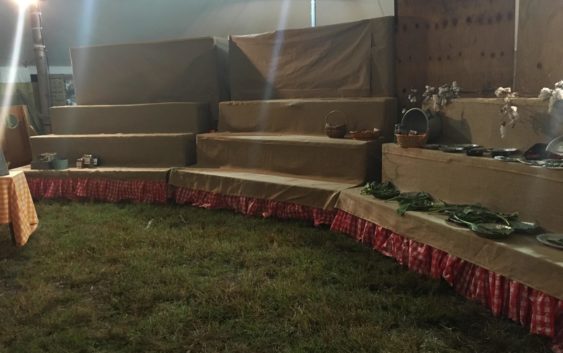- WATCH: Video Shows Confirmed Tornado touches down in Columbus County
- Residents begin clean up after storms, apparent tornado roll through NC Tuesday
- NC State researchers find increased fecal contamination in coastal waters due to sunny day flooding
- Flooding lingers in Liberty County neighborhoods near Trinity River with more rainfall expected
- North Carolina behind on hurricane preparedness, study shows
Despite Florence's impacts, Cape Fear Fair ready to roll

While livestock numbers will likely be lower than normal, agriculture exhibits are significantly down
WILMINGTON — There won’t be any alpacas in the Cape Fear Fair and Expo’s livestock tent this year.
Cindy McNally, who oversees the livestock tent, said the farmer who typically brings them lives in Pender County near Shaw Highway and suffered significant flooding from Hurricane Florence. The farmer had considered bringing the alpacas and sheep she usually does, but. McNally said, “It’s just too much stress” on the animals.
This year’s Cape Fear Fair and Expo, which starts Friday at the Wilmington International Airport, will mark the first time in anyone’s memory the event has taken place while the community is recovering from a major storm. Those associated with the fair say even if the storm has shaped the event in some ways — agricultural exhibits are down 70 percent, for instance — it has an important role to play in the healing process.
McNally, for instance, suffered downed trees and a roof leak at her Pender County home.
“Let’s just put all that aside for a few days,” McNally said Thursday. “It can all wait until the fair’s over.”
True to her word, McNally’s taking a step away from the repairs to oversee a tent that, as of Thursday evening, had 104 birds, more than 50 rabbits and two sheep on display. The number of bird entries is as high as McNally can remember, but some livestock such as sheep and those alpacas will not be making an appearance.
A farmer’s view
Elizabeth Reitz, a member of the fair’s board of directors, is among those farmers who won’t have anything on exhibit this year. During past years, Reitz had shown a cow, sheep and turkeys raised at her family’s Burgaw farm.
“I can’t bring any animals because they’re all scattered,” Reitz said, later adding her chickens had lived in dog crates for three weeks behind a friend’s shed while waters remained high.
As the water began to rise on the Northeast Cape Fear River, Reitz took a baby doll ram, a miniature donkey and a pot-bellied pig to the farm of a 90-year-old living nearby who swore his property never flooded. Then the water started rising on that farm, necessitating a rescue of the animals.
First came the pot-bellied pig and its feed, loaded into a jon boat. As Reitz went to sail him out, the donkey and ram were standing in waist-deep water — water that had risen to their chests by the time she returned.
“It’s like they were waiting for us,” Reitz said.
Reitz suffered 37 inches of flooding in her home. When the floodwaters started rising, there had been six heavy wooden pallets on the farm’s back pasture, stacked one on top of the other. That stack remained completely intact as the water floated it the length of two pastures and set them down again.
While the recovery process has started for Reitz and her family, she’ll be spending much of the next two weekends at the fair.
“We don’t have a roof over our heads,” she said, “but this gives us something to focus on that’s a little bit of normalcy.”
‘We understand’
David Barkley oversees the fair’s agriculture and education tent. Thursday evening, he stood within shouting distance of the table that takes entries and explained in the days after Florence, other local fairs had seen their entries drop at least 50 percent.
“It looks like that’s going to come true. I was hoping it wouldn’t,” Barkley said, adding a large storm like Florence will do major damage to crops — particularly one that comes around the last harvest of the season.
Then Barkley walked over to the brown risers that were meant to hold exhibits. Just hours before entries were set to close, those risers remained sparse, with some crops huddled together in the middle and others toward the far side.
Taking the scene in, Barkley said, “It’s more like 70 percent.”
Still, Barkley is someone who quickly searches for the bright side. He started discussing the peanut plant the fair will have on display this year, pulling it out and pulling back the leafy part of it to show where tendrils were shooting toward the dirt, small peanuts forming on them.
“We would like to have as much participation as possible,” Barkley said, “but we understand.”
Reporter Adam Wagner can be reached at 910-343-2389 or Adam.Wagner@GateHouseMedia.com.